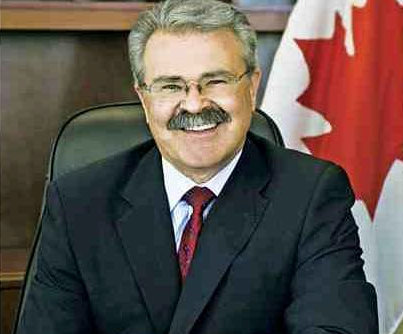Trade issues were front and centre in a meeting between Battlefords-Lloydminster Member of Parliament Gerry Ritz and the Battlefords Chamber of Commerce.
With Parliament in recess for the week, Ritz took the opportunity to hold meetings on a file that has kept him busy: international trade.
Ritz has been the Conservative critic for international trade in Parliament and sits on the trade committee in Parliament. The goal of the meeting at the Chamber offices, he said, was to get ideas and feedback that he could take back to Parliament and to Question Period.
It has been an uncertain time on the issue of trade due to new U.S. president Donald Trump’s pronouncements about renegotiating the North American Free Trade Agreement and possibly imposing tariffs on products crossing the border.
“The elephant in the room is the new administration in the [United States] and changes that they’ve talked about with NAFTA,” said Ritz.
In speaking to the News-Optimist, Ritz noted some wide variances in Trump’s position over time, which had gone from tearing it up to “tweaking” it.
“Right now, it’s the unknowns about what ‘tweak’ really means, what issues will be under scrutiny, how in-depth (and) what kind of changes the American administration think they want to see,” said Ritz.
He said he was buoyed by the fact Trump was surrounding himself with business people in his cabinet, many of them “global players” who might add a different dynamic. But he noted the uncertainty was an issue for business.
“As I said here, the one thing businesses don’t do well is wait. They want predictability and stability of that market access. So we’re hopeful that we’ll get some sort of an outline soon. It’s incumbent of our government to outline exactly what it is that we think needs to be done, and not just let the Americans drive it.”
Chamber members made clear their own nervousness about the protectionist tone coming from south of the border.
Chamber Executive Director Linda Machniak brought up concerns about Trump imposing a “border tax” on exports going to the United States. She thought it would cost people on both sides of the border.
“It will impact everybody’s pocket,” Machniak said.
“But it will impact them, too. I just don’t get it.”
While U.S. trade is a main issue, Canada has been moving forward with other trade deals around the world.
The recently completed Canada-European Comprehensive Economic and Trade Agreement is currently in the Senate and Ritz indicated it should receive royal assent in the spring. The provincial legislatures are in the process of approving it as well.
As for the Trans-Pacific Partnership, which the United States has pulled out of, Ritz noted there have been moves from those remaining to still go ahead with it.
“With the U.S. withdrawal, it put everybody into a tailspin,” Ritz said.
“But the general consensus, even through this last year, from the remaining countries is let’s move ahead anyway. They can rewrite a few clauses that the [United States] was the driver of, and continue to move forward.”
A meeting is coming up in mid-March in Chile involving the countries still interested as well as Colombia and South Korea, two countries that were not involved originally.
Ritz saw it as a positive development. “We need that to diversify our trade portfolio.”
Other related issues also were discussed at the meeting. One issue Ritz had been involved with directly as agriculture minister was country of origin labelling by the United States, which he opposed. That was finally struck down and it is Ritz’s belief it will not be coming back.
“Federal rules prevail. We have the jurisprudence, we have the WTO precedent now set that country of origin labeling cannot be done,” said Ritz.
Also discussed was the federal government’s proposed carbon tax, and the implications of Canada going ahead with one while its neighbours were not. Ritz pointed to a long list of other countries around the world that either did not have a carbon tax or had just repealed it.
“It really puts our trade-oriented businesses at a disadvantage,” said Ritz.”
There were also some frank discussions about another hot item in the news: the multitudes of asylum seekers crossing the border at Emerson, Man. from the United States into Canada.
Ritz acknowledged it was an issue, especially with many prospective immigrants still in the queue who were following the rules and doing the paperwork. Instead, the focus was on processing the asylum-seekers from the United States.
“We just had three phone calls this morning at the office saying ‘I can’t get a call back now because they’re telling us everything’s been focused now on these refugees, these asylum seekers.’”
Ritz said it was incumbent on Public Safety Minister Ralph Goodale as well as the minister of immigration to get a handle on the situation.
“Canadians are open-hearted people, but at the end of the day they want to make sure that people are following the rules, too.”
Next up for Ritz is a return to Parliament and the delivery of the Liberal budget, with rumblings that it could come down March 21.
He anticipates the budget will be a tough, tighten-your-belt one.
“This one’s going to hurt,” said Ritz to the meeting, referring to the money “that all went out the door last year.”
Ritz criticized the government for going ahead with providing $2.6 billion to two countries in South America to help them meet environmental targets. He said that money could have been used at home on water and sewer projects, including on First Nations.
“We’re seeing that money disappear, and really not creating any jobs in Canada,” said Ritz.




